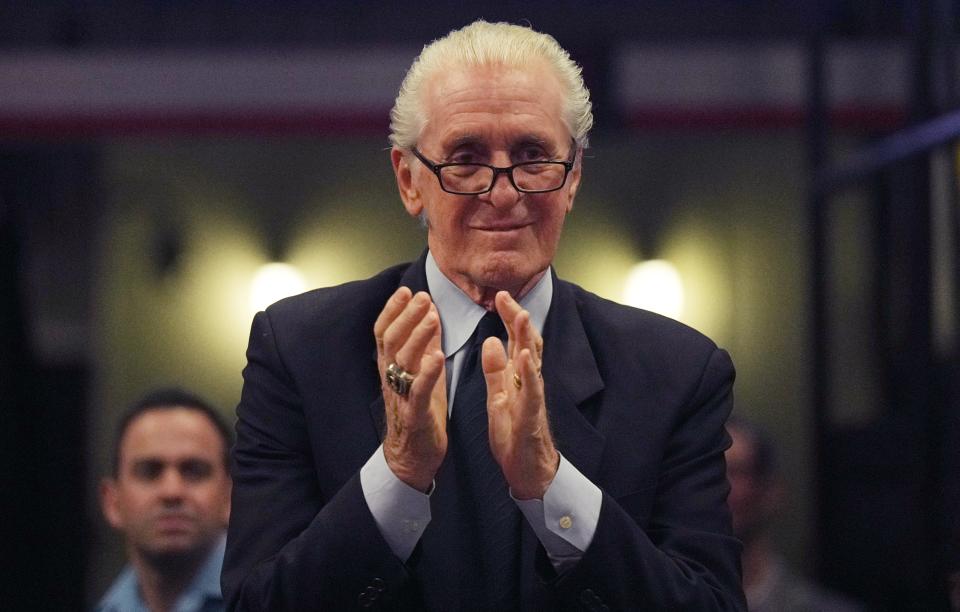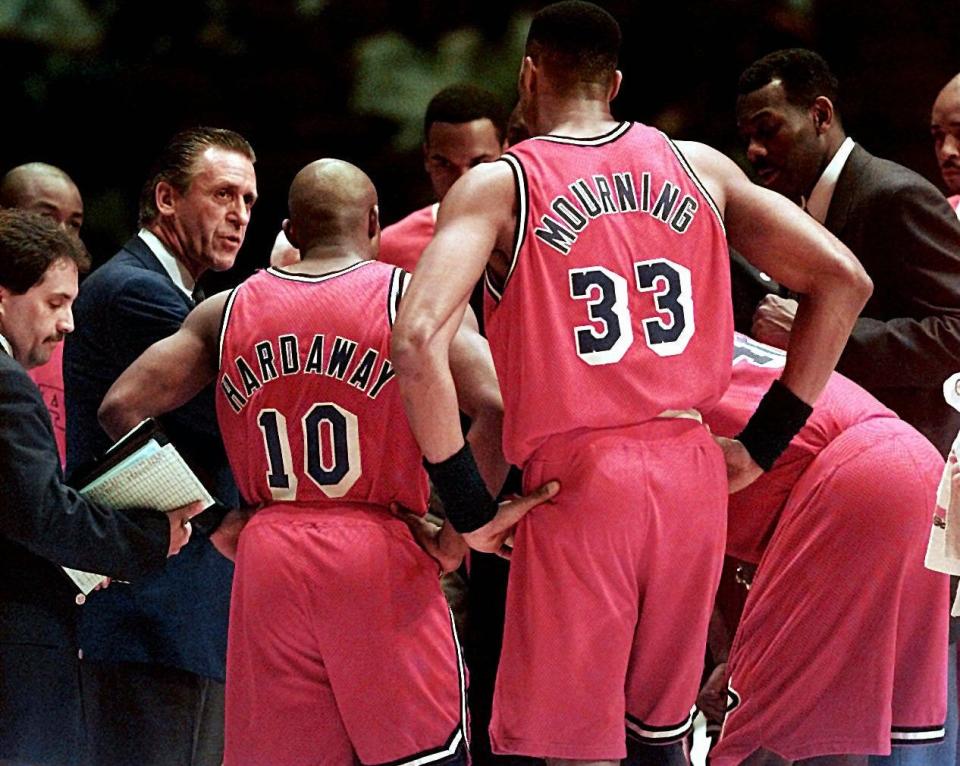As Heat president Pat Riley hunts for his 10th title, peers explain keys to success
At 78, Pat Riley is hunting.
Still hunting NBA championships for a collection that spans six decades and is approaching double digits.
"Just look at what he’s done in his career and it’s damn remarkable," said Jerry West, the NBA Hall of Famer and former executive for the Los Angeles Lakers.
Yes, just look:
A first NBA championship in 1972 as a reserve forward for the Lakers, a second championship in 1980 as an assistant coach for the team, and then the avalanche.
Four more championships in the 1980s as head coach of the "Showtime" Lakers, and a seventh championship in 2006 as head coach of the Miami Heat and eighth and ninth championships in 2012 and 2013 as president of the Heat.
Now this.
With Riley having constructed a Heat team heading into Game 2 of the NBA Finals on Sunday against the Denver Nuggets trailing 1-0 in the best-of-seven series, the hunt for a 10th championship is on.
HOW DO HEAT COME BACK? For Erik Spoelstra it starts with their 'toughness'
NBA FINALS INGREDIENTS Heat's secret sauce to building a winning roster includes dash of undrafted players
"And he wants to in the worst way win one more," Magic Johnson, the Hall of Famer who helped lead the Showtime Lakers, said of Riley. "He hasn’t changed. He’s still intense, I can see it on his face."

In addition to Riley’s trademark intensity, what else has propelled the Heat president and his signature slicked-back hair during an illustrious career that also included a four-season stint as head coach of the New York Knicks?
In search of answers, USA TODAY Sports interviewed West, Magic, other former Lakers and Bill Bertka, one of Riley’s most trusted former assistants. Riley has declined interview requests during the NBA Finals.
"He’s the architect of that organization," Bertka said of the Heat. "He’s the heart and soul, and it’s evident from what’s transpiring."
What Jerry West saw years ago
Between 1970 and 1974, Riley spent much of his time chasing after West during practice. They were teammates with the Lakers, and their relationship continued during Showtime. Riley coached teams assembled by West as the Lakers general manager.
"You can see his fingerprints over all the stuff they’re doing down there," West told USA TODAY Sports of Riley, later adding, "I mean, they’re never going to quit and they’re never going to die."
Riley took over as head coach of the Lakers 11 games into the 1981-82 season at 36 after Johnson forced out Paul Westhead. But West said he'd grown familiar with Riley's grit during the playing days.
"He’s aggressive in the way that you want to be, in particular, if you’re a coach," West said. "And if you look everywhere he went, he was very much a defensive-minded guy and that’s part of his personality, by the way."
Other Riley trademarks West said he sees in the Heat: They’re organized. They know what they’re looking for in players. They compete – relentlessly.
"If you watch how they approach a game, they like each other and they compete," West said. "It’s fun to watch."
What's expected of the leader
Magic Johnson, the Lakers' wondrous point guard during the Showtime era, said he served as a leader for Riley in the same way Jimmy Butler does for the Heat.

Butler, a six-time All-Star, has downplayed personal accolades during his quest for the Larry O’Brien trophy, awarded to the NBA champion. Johnson said it’s what Riley expects, especially of the team’s leader.
"Team first," Johnson told USA TODAY Sports. "Winning first. Making your teammates first. All those things were first for me and first for (Butler).
"That’s why the Heat are in the NBA Finals, and so Jimmy has lifted the play of all his teammates around him. He’s made them better. And because he’s the hardest worker on the team, those guys follow that. He’s tough as nails, so they follow that."
Same with the Showtime Lakers who, in a system designed by Riley, followed Johnson’s lead.
"They knew I was all about winning," Johnson said. "I didn’t care how many points I scored. I didn’t care how many shots I took. I just wanted to win. … So that’s how we are alike. And then we could take the game over when we wanted to take it over when it was winning time."
The impact of Pat RIley's 'core relatability'
The admiration for Riley crosses generations.
Johnson said, “Not only was he my coach but now one of my best friends." Butler once said, "That’s the Godfather, man, that’s the OG. A huge reason why I’m here, obviously."
Jamaal Wilkes, a Hall of Famer who played on three of the Showtime Lakers’ championship teams, cites Riley’s "core relatability" for his ability to connect with players over four decades as a coach and executive.
"He just likes people," Wilkes told USA TODAY Sports. "You feel it. And he loves basketball. And so it’s not a chore for him to interact with people.
"You know, some people they may be brilliant, very smart, but they have difficulty relating to people. And with Pat, that’s not an issue."
Johnson noted that Riley was open to suggestions during games. And Heat coach Erik Spoelstra, groomed by Riley, also has shown a willingness to listen to his players.
Shades of Riley.
The only kind of players Pat Riley wants
Mychal Thompson, a key reserve on the Lakers’ championship teams in 1987 and 1988, said he noticed something during the Heat’s series against the Boston Celtics in the Eastern Conference finals.
The Celtics’ third- through seventh-best players were more talented than their Heat counterparts. Yet that’s not how things played out in a series Miami closed out in Game 7 in Boston.
"You could see through the games, that 3 through 7 (for the Heat) had a better understanding of team basketball, making the ball move, not so much relying on one on one play," Thompson told USA TODAY Sports. "They move the ball very well and held up very well defensively, too.
"Pat Riley can recognize guys that understand the game and those are players he wants on his team. They might not be able to go out and be All-Star players. But they just understand winning basketball. That’s what he recognizes."
In that, Thompson said, he sees a thread that connects the Heat Riley built and the Showtime Lakers Riley coached.

"He had extraordinary talent through his years of leading Showtime," Thompson said. "But all those Hall of Famers he (coached) were willing to sacrifice their game for the good of the team for winning championships ...
"That’s the only kind of people he tolerates in his organization or on his team."
Signs of Pat Riley's demands
Kurt Rambis, the forward who sported iconic black-rimmed glasses as a member of the Showtime Lakers, pointed out what the Heat are doing defensively.
"It’s interesting they’re getting a lot of credit for their zone and we worked on a lot of zones too," Rambis told USA TODAY Sports. "So he’s kept that as a component as part of his defensive strategy. And he also expects guys to be individually accountable for their defense."
Rambis said there’s evidence of other Riley trademarks, such as conditioning, that have distinguished Riley’s teams.
"Part of the pursuit of excellence and being the best that you can possibly be is conditioning that he demanded of us, and I got to believe it’s something he’s still doing just watching them play," Rambis said, "It makes you very resilient."
'The key to winning championships'
Bill Bertka, Riley’s trusted assistant with the Showtime Lakers, suggested it’s no surprise the eighth-seeded Heat have become only the second No. 8 seed to reach the NBA Finals – and along the way beat the top-seeded Milwaukee Bucks and second-seeded Boston Celtics.
"The great attribute was to get players to step beyond what’s normal, do more than you’re capable of, and that’s the key to winning championships," Bertka said of Riley. "That was evident in the 80s.
"He was never satisfied with something working. If it works now, we can do it better. That philosophy sort of came across in a lot of things. If we did this and we won, we can do it better and more."
There is no magic to what Riley has done. But of course, there is a Magic.
"All the things that made us the Showtime championship team that we were, you can see in the Heat," Johnson said.
West was hoping to relay a message to Riley.
With a hint of mirth, West said, "Tell him don’t stop what you’re doing."
The hunt continues.
This article originally appeared on USA TODAY: Pat Riley, NBA Finals, hunt for No. 10: Peers dish on legend's secrets

 Yahoo Sports
Yahoo Sports 
